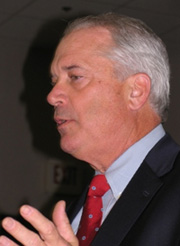Dave Christian illuminates the future of the energy industry
Dave Christian, CEO of Dominion Generation, understands what it is like to spend his days pursuing his career and his evenings earning an MBA, just as William & Mary Flex MBA students do and his business education has paid off – he now runs Dominion's energy production arm.
 At a recent William & Mary Flex MBA Speaker Series event, Mr. Christian discussed alternative and renewable power sources for electricity generation based on economics, a language MBA students understand, no matter their professional background. The bottom line? Analysis before decision-making and understanding the tools needed to conduct accurate analysis is what business is all about, especially in an industry as essential and heavily regulated as energy production
At a recent William & Mary Flex MBA Speaker Series event, Mr. Christian discussed alternative and renewable power sources for electricity generation based on economics, a language MBA students understand, no matter their professional background. The bottom line? Analysis before decision-making and understanding the tools needed to conduct accurate analysis is what business is all about, especially in an industry as essential and heavily regulated as energy production
Christian says the current top options for energy production are:
- Coal (which is dirty and not unlimited in supply)
- Hydro
- Solar (unlimited supply, but currently not very efficient or cost-effective)
- Offshore Wind (currently being subsidized to make it competitive)
- Biomass (energy industry does not want to compete with customers using biomass for other purposes)
- Nuclear (cheapest and cleanest, but waste storage and public safety perception are issues)
- Natural Gas (as a public policy issue, natural gas already has about 200 uses, while uranium has only one; makes economic sense to use uranium)
According to Christian, emerging technologies create more choices, but for the energy business, much of the decision-making comes down to economics and how much the customer is willing to pay. EPA, state, and other regulations further circumscribe acceptable solutions. Dominion must maintain a viable business model which incorporates accurate demand and regulatory forecasts, protects the environment, and guarantees customer service at acceptable prices.
Dave Christian supports nuclear energy as the most viable of green energy options. As a nuclear engineer, he is aware of the powerful safety regulations that minimize potential hazards. As an MBA, he understands the economic calculus necessary to keep energy plentiful and affordable. As an executive in a highly regulated industry, he knows that sophisticated analysis based on accurate data and forecasting is the key to making the right decisions for the future of energy.

